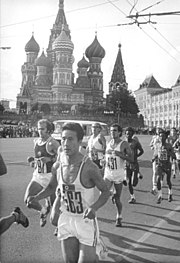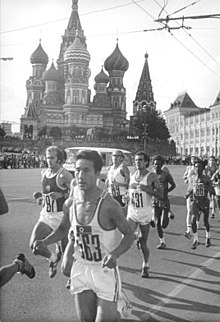1980 Summer Olympics / Athletics - Marathon (Men)
|
|
|||||||||

|
|||||||||
| sport | athletics | ||||||||
| discipline | Marathon run | ||||||||
| gender | Men | ||||||||
| Attendees | 74 athletes from 40 countries | ||||||||
| Competition location |
Luschniki Olympic Stadium (start and finish) |
||||||||
| Competition phase | August 1, 1980 | ||||||||
|
|||||||||
The men's marathon at the 1980 Olympic Games in Moscow was held on August 1, 1980. The start and finish was the Luzhniki Olympic Stadium . 76 athletes took part, 53 of whom made it to the finish line.
As four years earlier, Waldemar Cierpinski from the GDR was Olympic champion . He won ahead of the Dutchman Gerard Nijboer and Satymkul Dschumanasarow from the Soviet Union.
In addition to the Olympic champion, Jürgen Eberding and Hans-Joachim Truppel competed for the GDR . Truppel finished the race in eleventh place, Eberding in place 21.
The Swiss Josef Peter finished 40th, the Austrian Josef Steiner finished 39th.
Runners from Liechtenstein did not take part. Athletes from the Federal Republic of Germany were also not there because of the Olympic boycott.
Existing records
| World record | 2:08:33.6 h |
Derek Clayton ( Australia )
|
Antwerp , Belgium | May 30, 1969 |
| Olympic record | 2: 09: 55.0 h |
Waldemar Cierpinski ( GDR )
|
Montreal Marathon , Canada | July 31, 1976 |
Note: World records were not set in the marathon because of the different track conditions .
Routing
The race was started in the Luzhniki Olympic Stadium . After leaving the stadium, the route led to the northeast on the left bank of the Moskva . It went past the Cathedral of Christ the Savior and the Great Stone Bridge to the south side of the Kremlin . At Red Square , the route ran over the Great Moscow Bridge to the artificial island, which was created by the construction of the water diversion canal . It continued in an arc over the island in a south-easterly direction until it was abandoned at the southern tip. The course continued to follow the river until the turning point was reached shortly after the Novospassky Bridge . The same way it went back to the stadium. As in the other running competitions on the track, the goal of this race was there.
Race course
Date: August 1, 17.15 1980, local time ( UTC + 3 )
Due to the Olympic boycott, two of the best marathon runners , Bill Rodgers from the USA and Toshihiko Seko from Japan, were not there. The 1976 Olympic champion Waldemar Cierpinski from the GDR, on the other hand, competed here again. He was no longer rated as strong, but belonged to the group of contenders for a top placement. Since his victory in Montreal he had won four of nine marathons, but he missed victories in important races such as the Fukuoka Marathon and the 1978 European Championships . In addition, the reigning European champion Leonid Mossejew, USSR, the Belgian European Championship third and Olympic third party from 1976 Karel Lismont were given good chances.
The field remained together for a long time in warm conditions. At kilometer 25, the Mexican Rodolfo Gómez had pulled away. He was followed by a group of eight runners a. a. with the Dutchman Gerard Nijboer, Cierpinski and the three Soviet athletes Mossejew, Uladzimir Kotau and Satymkul Dschumanasarow. After another eight kilometers, Cierpinski broke away from the chasing group and caught up with Gómez, who could no longer follow Cierpinski's pace and joined the chasing group with four remaining runners. Cierpinski continued to run alone in the lead, while the pursuers with Nijboer, Jumanasarow and Kotau were soon only three. At forty kilometers Kowtow also gradually lost the connection. Waldemar Cierpinski defended his lead to the finish and became Olympic champion. Gerard Nijboer won the silver medal 17 seconds behind, after he had previously lost his last companion Satymkul Jumanasarow, who was fifteen seconds behind the Dutchman to bronze. The two Soviet runners Kotau and Mossejew followed in fourth and fifth place. Gómez finished sixth.
After the Ethiopian Abebe Bikila in 1960 and 1964 , Waldemar Cierpinski was the second marathon runner to repeat his Olympic victory.
Gerard Nijboer won the first medal in the marathon for the Netherlands.
Bottom line

Video
- 1980 Olympic Marathon in Moscow , published September 15, 2011 on youtube.com, accessed December 26, 2017
Web links
- SportsReference Marathon , accessed December 26, 2017
- Moscow 1980 Official Report, Volume III, Results , p. 38f, English / French (PDF, 28 MB), accessed on December 26, 2017
Individual evidence
- ^ IAAF Statistics Handbook, Berlin 2009 Page 565 ( Memento from June 29, 2011 in the Internet Archive )
- ↑ Route map in English with a sketch in Cyrillic script. , accessed December 26, 2017
- ↑ Moscow 1980 Official Report, Volume III, Results , p. 17 (schedule) / p. 39 (result), English / French (PDF, 28 MB), accessed on December 26, 2017
- ↑ SportsReference , accessed December 26, 2017





